#i have a solid understanding of how to identify and communicate them
Explore tagged Tumblr posts
Text
i have come to realize over the past few days that a lot of bad transfeminist takes on this website are percolating in spaces where it's presumed the transfem experience is one of either attempting to be recognized as a woman socially, or wanting to be recognized as a woman socially but not attempting (with an unspoken "yet" attached), and suddenly everything coming out of those spaces about transmisogyny makes sense.
transmisogyny never applies to men because if you're a woman, you know it already. or if it does apply to men, it always benefits them, because someone who looks like a man and occupies the social role of man could never actually be a woman, at least until they start trying to occupy the social role of woman. if a woman is closeted, she'll come out eventually. people who don't chemically or surgically transition and continue to use he/him are selfishly benefiting from transmisogyny, and don't want to come out because they benefit too much from enacting violence on trans women. transfems are always treated as failed women, and never as failed men, because being transfem means trying to be recognized as a woman. nobody could ever see a real transfem as a man, only men are seen as men, and transfems do things like use she/her and wear women's clothes and go on estrogen, which means everyone knows they're transfem. transfems who are men aren't a part of this conversation. tma people who aren't women don't exist because transmisogyny comes from being perceived as a woman.
and it's like. well. i certainly know lots of people who would directly contest & cleanly disprove your presumptions here (i mean. myself being one of them, even though i do present femme full-time!), but you'll never get the chance to have your worldview shifted, because you've made your social spaces profoundly unfriendly to them!
even if you've already made an effort to decouple transmedicalism from your theory, you still have to make an effort to actually engage with & understand the material experiences of people who don't align with current narratives about transition at all. transfems who use all pronouns and grow massive beards while on e and never legally change their names or gender markers. transneutral and transandrogynous tma people. trans women who refer to themselves as women but do not want to chemically or surgically transition or publicly use pronouns other than he/him, ever. full-time female impersonators who solely use she/her and chemically and surgically transition, but still identify as men. and you have to really engage with what we say about transmisogyny, as in, listen in good faith and understand what we're expressing about its functions in our daily lives!
or you could circlejerk forever about how being a woman is the be-all-end-all of experiencing transmisogyny and personal identification is one and the same as material conditions of privilege, to the point that personal identification automatically prescribes material privilege. and shut out a solid chunk of tma people from your gender theory permanently and irrevocably. and implicitly call a solid chunk of tma people liars for talking about daily life experiences. that's cool too, definitely won't have any negative consequences for trans community and trans spaces in the broader world or anything.
392 notes
·
View notes
Text
I don't think "We should help the poor/disabled people who are already here" is a solid argument against eugenics.
I mean, I think we absolutely should help the poor/disabled people who are already here. Sure. But as an answer to "Why shouldn't we prevent them from existing in the first place?" it feels like a deflection.
It is a deflection, really. And it just invites the follow up question "Why can't we do both?"
There's a general assumption that preventing a problem is a wiser and better resource investment than solving a problem that already exists, right? It's kind of framed as a point of snobbery -- "those silly reactive fools only think to solve problems, but I alone am wise enough to know we should prevent them!" (you're not exceptionally wise. Most people believe in preventing problems, even if they don't agree about how).
So why shouldn't we "prevent" children from being born poor or disabled? That's better than solving the problem! That's preventing the problem!
This is where I used to get stuck before I became strongly anti-eugenics, and part of that is that I wasn't thinking hard enough about capitalism yet -- "help the poor" is one thing; "radically restructure our economic system to ensure equitable distribution of resources so that 'poverty' is no longer a meaningful concept" is another -- let alone a real understanding of the social construction of disability.
But those things can come later. I think a compelling argument against eugenics requires two fundamental points that people are, for varying reasons, reluctant to make:
First: Diversity is, in and of itself, valuable. It is actively a good thing that a broad variety of traits exist. It is actively a good thing that people come in brown eyes and blue eyes and green eyes and gray eyes and hazel eyes, not because "Green eyed people have special talents for singing and hazel eyed people have special talents for baking" or whatever, but because variation is in and of itself valuable.
The problem with preventing the existence of people with Down syndrome isn't that people with Down syndrome have a specific role in society with a specific talent, or that they're preternaturally happy, or that they teach abled people an important lesson. The problem with preventing this form of genetic diversity is that most people only have two copies of chromosome 21, but people with Down syndrome have three. And any society dominated by people with two chromosomes needs a few three-chromosomed people for balance. The problem with preventing Deaf people isn't that Deaf people have special magical abilities; it's that most people primarily communicate with sounds, so you need some people who communicate other ways for balance.
It's not just biological traits. Diversity of experience is also valuable in and of itself. An only child is going to have a different experience than a seventh child. A child who grows up with a mother and father is going to have a different experience than a child who grows up with three mothers, or a single father, or two genderqueer parents, or four grandparents. Therefore, we need to support a variety of family types and structures without holding up one as "best."
Second: Life is never a bad thing. The circumstances of someone's life can be a bad thing; someone's actions can be a bad thing; but the fact that someone is alive is never a bad thing.
This one is an even harder sell than the diversity one, because we're all nihilism-pilled. I get it. You hate your life and you wish you'd never been born. Understandable. But you can't actually build a liberatory ideology out of that. Recognizing that life itself is not the problem is what enables you to identify the real problems (inequality of rights and resources). The problem is never "These parents had a baby they can't afford to take care of; this tragedy could have been prevented if this baby hadn't been born." The problem is always "People are systemically denied the resources needed for survival."
28 notes
·
View notes
Text
Being Human: A Species Identity Compare and Contrast
Written by Gavin Reed-Machina on June 27, 2024.
Hey, I'm Gavin, and despite hanging out in various alterhuman spaces, I'm 100% a human person. I live in a system with two headmates who are also human, but identify as other species as well - Max as a velociraptor therian, Jude as a dog archetrope and an android. In contrast, I specifically, completely identify as human.
What's so special about that, being human? Statistically, it's nothing remarkable - most people on Earth identify as human after all. I think what's really interesting is that, over the past year, I've been connected to communities that all contain people (or non-people, as the case may be) who partially or fully identify as nonhuman - otherkin, therians, a solid number of fictionfolk and some alterhumans. Therefore, I feel like I can compare and contrast my species identity to the experiences of others, in a way that most people who philosophize on what humanity is don't get the chance to.
We tend to think of humanity as The Default, a non-identity, since the majority of self-identified nonhumans were raised as human, and we all live in human societies. Most people don't bother clarifying that they are human unless they're dehumanized, because it seems obvious that being born human means you're human. Given humanity's position as a default state, a lot of nonhumans see it as an opposing and fundamentally different experience from nonhumanity.
In this way, species identity is similar to gender identity - cisgender people, who identify with the genders they were assigned at birth, are often assumed by transgender people to have a fundamentally different understanding of gender. I feel like both of these assumptions are oversimplifications, ones that miss out on a lot of nuance, and throughout this essay I will be comparing gender and species, as a trans man whose species is as important to him as his gender.
There are some common threads I've noticed when it comes to having a sense of identity. I wouldn't call them universal experiences, I can't read minds, but they're frequent enough to be significant. They may be more obvious when it's an identity at odds with your body (e.g. being transgender or nonhuman) - but I'd go so far as to say that plenty of cisgender (and human!) people also experience these feelings, and simply don't have the words or desire to describe their feelings with these terms.
First off, identity euphoria - the internal sense of alignment, joy, and contentedness one gets from presenting and being perceived as their identity. A trans man might experience gender euphoria from presenting and being treated as a man, and so do many cis men. Think about how thrilled many guys are when their beards fill out; that's facial hair as a presentation of masculinity, and gaining it is a gender euphoric experience. In a very similar way, a nonhuman experiences species euphoria from being perceived as their species - and so do I, as a human being.
I’m trans, so I know how gender euphoria feels for me. I find that the more I'm just treated as a man, the more that the bright elation of being correctly gendered turns into a sense of quiet satisfaction - this is what I am, and everyone knows it, and all is right with the world. There's no reason to think too much about it unless something calls attention to it, and then I feel confident and comfortable enough in myself that other people's judgements are more annoying than hurtful. I exist peacefully in my body, happy with the way people see me in it, and sometimes I'll do something that feels extra masculine and grin about it for five minutes.
My species euphoria falls into the same sort of category - I feel content with my body, the way it matches how I feel internally, and the way other people treat me because of it. I feel fundamentally comfortable with my human body map and movements, having a flat face and hands and nails, walking upright on the soles of my feet. I feel comfortable when I'm acknowledged as a human and a person, when I do something that’s known to be human - when I wear different clothes to express myself and keep out the cold, when I cook a meal to eat with people, when I sing for the fun of it, when I write and draw to share something creative, when I interact with human technology and invention and creation. Humans have been making clothes and foods and songs and adding marks to the world for about as long as they've existed, and we're still doing it, and if I think about it too long I get emotional. I’m human and I feel deeply connected to humanity, and most of the time I don't think about it because I'm treated as one, but sometimes I’ll notice that I'm doing something that just feels fundamentally human, and it's really nice - sometimes species affirmation can be in the little things, like wearing a beat-up jacket or writing a personal essay.
On the flip side, there's identity dysphoria, the distress experienced when one's identity doesn't align with the way they present or find themselves perceived as. A trans woman might feel gender dysphoria because of her body hair; many cis women also feel less feminine if they don't shave. Species dysphoria is a well-known experience in the nonhuman community, the distress of being seen as human or having a human body when you don't identify as one. Given what I said earlier, hopefully it doesn't come as a shock that people can have the opposite experience - feeling distressed about being seen as nonhuman. I get this kind of species dysphoria.
It feels odd to talk about species dysphoria when I’m not nonhuman, but I still feel it. Mostly it comes up in the context of being in alterhuman spaces, being accidentally mislabeled as nonhuman through proximity to those who are, and I've also felt it in the context of playing around with visualizing myself as nonhuman in art. My body map doesn't have nonhuman features, parts like wings or tails or claws or pointy ears. Picturing myself like that feels wrong, it feels like sandpaper, like there’s this foreign thing attached to my body and I need to cut it off so I can stop this crawling sense of my body not being my own. I used to have an awful amount of gender dysphoria, and I feel like the two are very comparable experiences - the distress of feeling like your body doesn't match your mind. I got top surgery, so the gender dysphoria is gone, and thankfully my body is actually human, because I would be just as distressed about being seen as nonhuman as I was about being seen as a girl.
It’s kind of fascinating that I feel this way, that I can’t picture myself as nonhuman without feeling incredibly uncomfortable. On the other end of the spectrum, there's the entire furry fandom, a subculture of people - most of whom definitely identify as human beings - who regularly depict themselves as nonhuman animals for fun and self-expression. We’re all human, what gives? Do they have a more malleable sense of species identity than I do?
Maybe, maybe not. I don't have a straightforward answer to that - like I said, I can't read minds, and I'm just one person. But I do have a couple thoughts on the way humans interface with nonhumanity, on the topic of enjoying it.
See, I get dysphoric about being considered nonhuman, but I've found some loopholes in there. I’m completely fine with my fictional counterpart - the character getting tossed into different AUs for our personal enrichment - being turned into a vampire, a werewolf, a selkie, an android, a person with wings. How's that any different from other expressions of nonhumanity? Well, for me, those stories don't induce dysphoria because they're about humanity, at the end of the day - how people cope with being seen as or turned into monsters, the way they treat one another and the way they treat supposed outsiders, the ways society might change if humans were slightly different animals but still called themselves human. If I were a werewolf, I'd still be human, just one living with the consequences of also being a wolf. If I had wings in a world where all humans have wings, I'm still human in the context of that world. That baseline sense of humanity is what’s important to me.
In a similar vein, I can't stand seriously being seen as nonhuman - but pretending to be nonhuman? Roleplaying? Dressing up in a costume? I can do that. I feel like there’s something very human about being fascinated by the abilities and strengths of every animal that's not your own kind, and wanting them for yourself - the human desire to fly like a bird, swim like a fish, hunt like a wolf, run like a deer.
I think a lot of what people like about fursonas is this sort of wish fulfillment, of having the cool traits of all these fascinating animals, and having that animal self-portrait still being anthro - human - enough to relate to. It's animality through an anthropomorphic lens, through how fun it can be to play pretend and express yourself as a cool deer-wolf-lion hybrid. And usually, those animal choices are symbolic, and the fursona reflects the personality of the person who made it - more often than not, it reflects the cultural stereotypes of what that animal is, instead of being true to what the animal is like as a living organism. It's about the way humans see themselves in animals, not necessarily the way we are animals. So, ironically, being a furry tends to parse as a very human thing to me.
So far, most of this essay has been a comparison, since I see a lot of similarities between identifying as human and identifying as nonhuman. Putting my species into my list of self-identifiers, like how I'd list my name and pronouns, has cemented it as a crucial part of how I view myself and want to be seen. That's the same way a lot of nonhumans think about their species. I have a strong sense of species identity, it just so happens to align with being human. Contrasting the categories seems harder to me.
I could list a bunch of different nonhuman traits that I lack, but it would be on the same level as saying one kintype is different from another. I don't care about walking on all fours, and neither does Max as a raptor. I don't instinctively try to bite a threat, I’d rather kick it, and I know a horse would agree with me. I don't long for the sky and neither does Jude, they're a dog. I don't have a prey drive and neither does a hamster. I don't feel like a nonsapient animal, and neither does an elf.
When it comes down to just being a certain species, there’s not that much of a difference between identifying as a human and identifying as a dragon. There's a bunch of traits that feel correct, and a million others that don't feel right at all.
I could say that I don't understand feeling like I don't fit in my own body, but I do - I had gender dysphoria. I have species dysphoria. If one of my partners is having a phantom shift while co-fronting with me, I invariably end up either leaving front or nullifying their shifts, because I just don't feel comfortable if our combined body map is nonhuman. I don't have memories of being a different species than I am, having abilities that I don't have in my body now, but those aren’t necessary to be nonhuman in the first place.
Do I need to find a contrast that makes sense? Does there need to be some fundamental difference between human and nonhuman identity?
I don't think so. It's all identity, at the end of the day.
#personal essay#alterhuman#human alterhumanity#otherhuman#otherkin#therian#nonhuman#species euphoria#species dysphoria#gavin talks
120 notes
·
View notes
Text
To celebrate Ace Week, October 20 – 26, 2024, here's the Asexuality 101 post I shared with coworkers, this year.
Feel free to share it with other folks who you’ve had to explain Asexuality to, from scratch. Again: it’s just the basics.

Statistically, with around 1% of the population identifying as it, most of the people reading this article aren’t asexual, and they probably don’t know anyone who identifies as asexual, and if they do, they probably don’t know them closely enough to know anything about their sexuality—especially if it’s somehow defined by there being… less of it… or is it none of it? It’s all kind of confusing.
So, what’s there for you to be ‘aware’ of on Ace Week? Lots. Maybe even everything.
A sky full of more than just stars.

This (above) is a picture of the night sky over Alberta at around 9 PM, this Wednesday, October 23rd, 2024. It’s probably nothing like the night sky you've seen before, because it’s how the sky looks when seen through the microwave spectrum.

You’re used to seeing a sky that looks like this (above). This is the same bit of sky, as it appears in our “regular” spectrum of visible light. But notice how the microwave view of the sky reveals an entirely different sky, where nearby space is suddenly far more hectic, complicated, and full. It’s a sky full of things your ordinary eyes can’t see or measure. That’s what happens when you look at the exact same thing through a different lens¹.
Most of us understand sexuality along a spectrum of who, or which. Who are you sexually attracted to? Which genders are you attracted to? One, any, all? Asexuality looks at the same world, but measures things differently, instead of who or which, it asks how much, or when. How much sexual attraction people are capable of experiencing, and in many cases, where, how, or when that attraction can be experienced.
Asexuality is a bit more complex than just, “people who don’t feel any sexual attraction.” Some asexuals fit that definition, but they’re the very-visible minority. Just like the microwave-view of the sky wasn’t solid glowing purple, asexuality manifests in a variety of forms. The less-visible majority² of people the asexual spectrum are sometimes labelled as demisexual: people who experience limited or very selective primary sexual attraction, usually based on an emotional bond.
Asexuality isn’t a broken or underdeveloped expression of cisgendered heterosexuality. Asexuality lines up and coexists with the who-or-which so-called “regular” sexual spectrum. There are gay asexual people, bi demisexual people, asexual or demisexual lesbians, transgender demi people, and hetero-oriented aces. (Notice how in the microwave image of the sky, the same stars are still there, and the Milky Way is where it was.) This is why you might hear about the many micro-labels within the asexual community, as people develop ways to quickly communicate how they inhabit their place along the asexual spectrum.
“Back up a bit, primary sexual attraction?”
Wikipedia defines primary sexual attraction as “the type of attraction that is based on immediately observable characteristics such as appearance or smell, and is experienced immediately after a first encounter.” People on the asexual spectrum experience little to none of this, and people who identify as demisexual often explain the attraction they feel as being above primary sexual attraction. It’s complicated, and more than we can cover in a single post. What’s important to know is that asexuality is a big, big topic because it covers as much ground as the allosexual spectrum you’re used to.
“Hold on, Allosexual?”
Asexual people (asexuals, aces, etc.) have our own jargon, because of course we do. One of those words is allosexual. From the greek word állos, which sometimes translates to “other”. Allosexual or others-sexual. People who are attracted to other people. It’s shorter than saying, “people who aren’t asexual,” and politer than the other words we might use to describe you.
So, what now?
Probably nothing. As exciting as it is to know there’s a whole other spectrum out there (and spoiler, there are many spectra, there’s also a romantic-attraction spectrum) the reality is, it’s small. In the few surveys that have been conducted, it seems as though only about 1% of the population identify as asexual in any way. (There are probably a few more of us, living with identities we were assigned by the world we grew up in.) For the time being, this may just be a neat-to-know thing, and a prompt to go visit your local observatory, to see a microwave telescope.
But for a few of you, it might be the beginning of a journey of self-discovery. You may have learned a few important new words here, or found a new way of seeing things that explains why you are the way you are, or why someone you care about is the way they are. If so, please be gentle. Asexuality is a large topic being explored and lived by a small community, most of whom are still in the middle of figuring out what this all means for us.
One of the safest places to start is Angela Chen’s gracefully-written book, Ace: What Asexuality Reveals about Desire, Society, and the Meaning of Sex. Written by a journalist, it gets into self-discovery, implications for partners, the medicalization of asexuality & the ways people try to “cure” us, and it even gets into the complexities of being asexual inside of a cultural context that might not leave room for asexuality.
From there, have look around the oldest Asexual community, the Asexual Visibility and Education Network, AVEN, or carefully look through your social networks’ asexual or asexuality tags (1% scales up well in a large community, but always remember you're on social media).
You’re not alone, you’re not “broken”, you’re not “delayed”, you’re not heartless. You’re part of a sky full of more than just stars.
Footnotes:
¹ Yeah, yeah, technically, microwave and visible light aren’t separate spectra, they're just different subsections of the bigger electromagnetic spectrum, and space is full of stuff that emits energy all across the full electromagnetic spectrum all at once. Sort of like how we're all a little bit of everything on the entire spectrum of human-expression, just in different proportions. But wow, if you thought this was already a convoluted post, can you imagine what a post that used that model would have looked like? So, let’s all agree to stick with the more casual way of describing electromagnetism. All least until after Ace Week, so we don’t wreck the mood.
² Demisexuals and other variants of asexuality are underrepresented for a number of reasons: it can be too complicated to talk about, it can be exhausting to defend your place on the spectrum, or you might not even see yourself as demisexual because your relationship feels “ordinary enough”. This is why we have Ace Week. It's an opportunity to let people know there are other words to explain how they feel, or how they express their complicated sexuality.
About the Author:
I was 12 when I realized I didn’t prioritize the same things my friends did. They were starting to explore crushes and boyfriends and girlfriends, while I was getting into graphic design. (1983.)
I was 21 when I realized I was “behind schedule” getting into “the dating thing.” Even back then, I thought of it in abstract terms like ‘dating’ or ‘being in a relationship’, I didn't personify it in any way, using words like ‘meeting a girlfriend’, or ‘becoming a boyfriend’. (1992.)
I was 37 when I realized there was clearly something off about me, and accepted that—for whatever reason—I didn't do relationships, and I decided to just focus on my career, and hobbies, and and and. (Late 2008.)
I was 51 when I learned there were words for what I was: Asexual and Aromantic. (2022.)
I was 52 when I started coming out as AroAce (2023).
25 notes
·
View notes
Text
You stopped using critical thinking skills, and now you're making it artists problem.
A few days ago I made this post right here, stating that people need to start learning art history before making baseless claims of generative artificiality to make art.
There's a deep conversation that I feel like I want to take about and a nuance to that topic we need to observe as a general whole. First off, this is tumblr. Everyone here thinks they're an expert on something and that's just... how this site has worked for a long time. (shout out to my old heads, tumblr is still here somehow) There is an attitude of grandeur here, especially when it comes to artists and their work. A lot of people, on social media, have a false cape on in regard to "taking down AI". It's very prevalent within circles of young artists (not young in age, but young in skill/craft) and non-artists thinking they can call out or clock something as AI when they themselves have no real understanding of... frankly, any of it? Not saying that young artists and non-artists don't have the potential to learn or grow or move passed this mindset, but they don't have a developed enough eye to make those claims.
Art at it's core is imperfect, it's raw and wrong. Beautiful and broken. You can't take one wobbly line and say "SEE, LOOK!!! AI!! ITS AI!!" because it's likely not. There's is a level of appreciation for those that want to stand up for artists, IF that's what they were doing. But in most cases it's not. In most cases its outrage farming and ragebait. They shout these things in order to convince you to be angry and click click click away. They don't necessarily dislike or even hate artists, but they want their own engagement first and foremost.
Over the last, I wanna say week, there has been a solid number of people joining in on a new drawing meme using this image from pin-up cover artist Casey Jones. A few people on bluesky claimed that Jones piece was Artificially generated simply because the anatomy wasn't perfect and seemed a bit "strange". A lot of people responded and corrected them, which in itself isn't the issue. The issue is the art work was given a label, something you could tangibly hold in your hands, from a time before digitally rendered art work, of not being real due to it's perceived imperfections.
Quick art history and US history lesson (with plenty of imperfections for y'all to gnaw at like rabid gnats) on art from the 1940s, 50s, and 60s. In the 30 years of artistic endeavors, the forefront of art at that time was men (debatably) who would create all artist works from pro-war posters to ledger heads for news papers. That was also a time of the hyper idealized sexuality that centered white women. Often enough, the subject matter for some of these works was a scantily clad white woman with perfect hair and proportions that were considered best at the time. A perky chest, long torso, thin long arms and legs, and no behind. That was the appeal of the time. (I would get into the... racial biases but mmm not right now) This was also a time of soldiers being far away from home and possibly wanting "something" while over seas. Photos weren't easy to send, and communication was an weekly or bi-weekly get. (I don't remember which) So the sultry girl on the cover of the joke book was there... ahem... moment... (I don't want this getting axed so I'm trying to be yahoo x-tian clean) With that in mind, there's a lot of exaggeration going on in these pieces. Yes, even in the more inclusive ones. So just like today, when people say "oh that's just my style" artists back during that time hand the same if not a similar mindset.
I'm gonna wrap this up on 2 notes; the first being, until you have trained and developed an eye for identifying gen AI versus old art versus anything else, please keep your comments to yourself. I personally block AI whenever I see it. We live in a crazy dystopian time period and that alone is enough to raise the hackles on a lot of us. Cautionary tales are cautionary for a reason. The second point I would like to make is one that has been iterated and repeated ad nauseum, gen AI is the tool of the oppressor, not the tool of the oppressed. You'll see a lot of people, typically people that invested a large sum of money into the gen AI machine, say that it's good and helpful for disabled people and yhack yhack yhack. It's not, it never has been and never will be. It's main uses are to create false narratives. Falsehoods that only serve themselves. Please keep that in mind.
TL;DR - Learn your art history, do your research, and stop bolstering AI because it's actual fucking trash and you should know better.
#going batty#i lost power in the middle of writing this#but my goodness did i need to say it#i needed it off my mind#that shit is bad bad bad#it's literally the tool of the phahsceests to create propoganda to feed to us and keep us fucking stupid#stop talking about it stop utilizing it let the bubble burst#let it die so we can go back to enjoying art bro#long post
12 notes
·
View notes
Text
This post is a glowing tribute to Fixing RWBY, but unfortunately, it's written with the tone, structure, and self-awareness of a caffeinated teenager who just discovered the concept of fanfiction and thinks they’ve ascended to a higher literary plane for recognizing a rewrite with competent plot coherence.
1. “HOLY FUCKING SHIT THIS MAN IS A GENIUS!”
This opening line screams emotional overdrive. You're not delivering critique—you’re having a spiritual experience. Dial it back. “Genius” is not a title you throw around like confetti every time someone rearranges a story you didn’t like. And the crying emoji-style “T_T”? Are we writing a critical review or a middle school Tumblr post?
2. Empty Hype, No Depth
You say, “this right here is QUALITY,” but your evidence is as shallow as a kiddie pool in a drought. You're listing things you like, not explaining why they work. “Roman is likable now!” Cool—how? What’s different about his characterization, goals, or development that fixes the original? What specific writing choices redeemed Jaune, a character you claim to loathe? You drop these lines like mic drops, but they’re not arguments—they're fan squeals.
3. Tone-Deaf Elitism
“Do ya'll understand the actual FEAT that is? I don't think a lot of fans do because many fans DO NOT KNOW HOW TO IDENTIFY GOOD WRITING.”
This is where the post devolves into full-on Holier-than-thou arrogance. You watched a fan rewrite and decided that most fans are too stupid to recognize quality unless it's spoon-fed to them by Celtic Phoenix. It reeks of superiority complex. Having preferences is fine. Acting like you’ve discovered divine truth and the rest of the fandom are ignorant sheep? Cringe.
4. Vernal as Raven’s Second Daughter Is Not “Genius”
You gush over the rewrite’s version of Vernal like it’s a Shakespearean revelation. A tribal daughter acting as a foil to Yang is a neat concept, but calling it ACTUALLY FUCKING GENIUS is like calling a plot twist in a CW show Kurosawa-tier. It’s a solid idea—not an intellectual breakthrough. And her “little bear Grimm mask”? You’re giving fashion commentary like this is Project Runway: Remnant Edition.
5. "Red Vergil" Adam = Style Over Substance
You hype up Adam’s new red-themed design as if color coding now counts as character depth. “More red = more insane” is peak Hot Topic logic. Sure, visual symbolism is powerful, but if your takeaway is “this makes him look cooler and more dangerous,” you’re evaluating characters like trading cards, not narrative tools. That’s not critical analysis—it’s aesthetic drooling.
6. “Top 1 in the Community, Bar None”
Saying Fixing RWBY is “top 1” without comparison or reasoning just reveals how narrow your lens is. You haven’t examined other rewrites or fan reinterpretations with any critical distance. You’re infatuated. This isn’t a review—it’s a Stan post.
7. Structure and Grammar: A Dumpster Fire
The formatting is chaotic, the grammar is loose, and the structure is nearly nonexistent. Multiple exclamations, all-caps shouting, and rapid-fire images with no real explanation make the entire post read like a Discord hype rant, not a thoughtful breakdown. If your goal is to convince anyone of FRWBY’s merit, this isn’t how you do it—it reads like spam.
Conclusion:
This post is uncritical fan worship disguised as commentary, propped up by overexcitement and a condescending tone toward the rest of the fanbase. It lacks nuance, evidence, structure, and maturity.
Final score: 2/10. One point for enthusiasm. One point for at least having some thoughts. The rest? Hot air.
6 notes
·
View notes
Note
this might sound weird, and honestly I'm only asking to see if anyone else feels this way, but is like... butch imposter syndrome a thing? like I identify as a butch but I'm always worried I'm not like... butch enough if that makes sense.
i think this is an interesting application of the pop psychology term "imposter syndrome" tbh - rooted in the idea that Butch is an achievement and something one can fail at or be a faker/imposter, in the way that (so-called) high-achieving workers/professionals doubt their intellect, skills, or accomplishments. i just don't think this is really a helpful application of the concept but i will answer regarding your concerns and worries!
i personally don't believe butchness is something that one achieves or like aspires to but instead is something that one IS (but that's just my view ! i know not everyone sees it that way and that's fine, it's interesting. we don't all have to have the same conceptualization or worldview about things). i think there are many types of butches, not just one. i think that some people are butch no matter what they do, they cannot help but be butch. and other people can see it in them and treat them differently for it throughout their life, for better or worse, and whether they have the language for it or not. while for other butch people, they are butch for a time, but later find themselves to be something else and they stop being butch (or vice versa, they are something else and later come to find themself becoming butch). again, i don't think there is one true butch or way to be butch. there are LOTS.
i do believe that this sort of experience that it seems like you're describing - being worried about not being butch enough, questioning whether one is 'truly' the identity/label that one currently knows themself as - is not uncommon. i certainly see folks talking about experiencing this not infrequently! i see similar questions asked all the time. you're certainly not alone.
our advice would be to talk to other dykes that you know about how you're feeling and some of your thoughts, get their take. that can help a lot. spend time with other dykes of all kinds. also, as always, focus on the Doing and not the Labeling. the power of a good haircut that makes you feel like hot shit can't be understated. finding some dope leather boots or a pair of pants that finally fits and makes your ass look so good! flirting with a cutie!
some questions to consider, ask yourself, think about that might help you: where is this worry/fear/concern coming from? what makes you worry you’re not butch enough? what is “butch enough” to you? what does it look like? who are some people that you know are definitely butch? what are they like? how does someone who is “butch enough” carry themselves, act, dress? is that concept or ideal something you agree with and believe in? is it something you enjoy being and doing? is it something that you want to be? are you dissatisfied with how you look or what you do right now? how do you wish you were? are you afraid of criticism or seeking approval? from whom? do you value their opinion, does what they think matter to you? are you afraid of not receiving attention, of other people not being attracted to you, not being valued as part of your community if you aren’t a butch or butch enough? have you applied a label and identity to yourself and then tried to live up to it, or have you lived as yourself, seeking confidence and resonance and after that, then used a word to describe yourself?
there are no right or wrong or bad or good answers. just think about these things and evaluate how you feel. it will hopefully help you find some answers and clarity and determine where to go from here.
just remember that you're cool no matter what you are. if you become solid and confident and rooted in your butchness that's dope! or if you come to understand yourself in some other way that's dope!
69 notes
·
View notes
Text
you know what an ask blog is, why else are you here.
I wont be starting with character fluff, ill put that at the end, so read it if you want a visual understanding of who your talking to and how they will talking.
Warnings
I am an adult [by definition], and since i have little knowledge on who is on the other side of the screen, this space will be treated as an adult area. Posts are subject to include the following:
Suggestive descriptions and intimate innuendos
Descriptions of violent acts or bloodshed
Blunt and brutal honesty, because patience and kindness is a resource i spend at my discretion
Scariest of all, many posts will contain the horror that is "roleplay"
Excessive sarcasm
"Rules"
Asks that are directly sexual in any form will be ignored, so don't even bother
Generally speaking, if you are blatantly disrespectful to any particular group of people, you will be ignored at best, blocked at worst. 2.5: This does mean this blog is a safe place for any and all of the lgbtq community no don't make me type the whole acronym, i don't know what it is.
There is a negative chance you will be successful in shipping the shadow with someone, please take your attempts somewhere else
"Rules" will be added and changed at mod discretion, if and when i see fit.
Notes
The person who runs this blog, me, has almost no idea how to properly format tumblr posts, neither do i care to learn, so everything will be done on a whim
Additionally I have a total of 0 (zero) art skills, so the only picture that will be shown, unless someone else with free time and an interest in this character and decides to make art [which would be awesome], is the picture used as the blogs icon, the mask seen in which is from here.
All of this is done for fun and to entertain the person behind the screen, do note take anything here too seriously, because i sure am not
I have decided to go by "Tome" as how you talk to the mod directly. Why? Because like a tome, I have an ungodly amount of knowledge regarding what is happening in this group of ask blogs, so it felt fitting
Character/roleplay information
The shadow will speak with basic text, while occasionally having changes to their text to show things such as emphasis, or acts such as whispering/speaking under their breath, and to indirectly refer to another person through the use of color and emboldening.
-The shadows actions are depicted through use of text surrounded by hyphens, shown here-
[Mod talk, from I, Tome, is contained within square brackets]
(Context, narration, and important notices are contained within parenthesis)
{Rarely, the curly brackets will be used if mod to character interactions happen}
Reoccurring characters will eventually be listed within this post, when i feel like being less of a side character, please treat their mods with respect.
The "residence" of the shadow is a royal mess of enchantments, letting them have easy access to any part of the lands of the old faith, alternate reality or not.
Character description
The shadow is a creature who's form is crafted from a pitch black substance that seems to hover around the sublimation point, often times acting more akin to a gas than a solid, seemingly at the will of the shadow itself.
Standing around 6'1", they have no obvious gender, with all features being vague and hard to identify, or exceptionally androgynous, additionally having a pair of pointed canid ears sprouting from the top of their head, and several large fox tails trailing out behind them. [For visual aid, think any media depiction of a nine tailed kitsune.]
Their attire is made mostly of muted colors and dark tones, similarly to their shadowed form. Covering their face, they don a handcrafted mask made to resemble a red fox, despite their other canid features suggesting them to be one. Their upper body is covered by a large and baggy grey shirt with torn hems, a deep blue cloak further covering their form, with a light grey scruff, held in place by a broach depicting a red flower with five petals, white semi circles between the petals of the flower, all encircled by a ring of gold. their arms seem to have a bright red string wrapped around them, looking very out of place among the rest of their muted clothes. The attire for their lower body is rough and simple, consisting of a pair of baggy red pants, with several roughly sewn patches made from fabrics of various materials and colors, and a simple pair of black boots.
Final notes
This character exists for the soul purpose of interacting with ask blogs revolving around the game "cult of the lamb" [but if your here you probably already knew that], so while some of the statements of the character might break the fourth wall in the context of the game, that wall has already been removed by the other blogs, so i care not about its existence
The flower depicted on the brooch is not a Camellia, neither is the character a follower of any of the bishops.
The tag "Pages turn" will be used when an ask is responded too by the mod alone, if you wish to see what I, and I alone, have to say, use that tag.
8 notes
·
View notes
Note
Honestly, from my experience, the term “therian” was pretty solid and consistent in definition until recently. Just under a decade ago, I could ask twenty therians all from different platforms with completely different identities what the definition was and get the same answer with some minor wording differences from all twenty. Today, if I ask five therians who are all mutuals with each other for the definition, I’ll get five completely different answers that all have vastly different implications on what the term means about their own identities. It’s gotten to the point that I have to read through personal essays to figure out if someone is using the term in a way I recognize or not because it’s become so fluid, essentially making it lose all meaning in the last year or two. I’ve even had to specify what timeframe my “version” of the definition comes from so others don’t have to do the same more than once this year. I’m not surprised the community’s newest don’t know what they’re talking about. The definition misinformation started awhile ago with individuals who have been in the community for years.
This is mostly me rambling in your askbox and being a little salty, sorry, but I do get what you mean. The constant battle between not wanting to be the asshole that refuses acceptance and progress and wanting the label I’ve used for years to actually consistently match who/what I am is insane. New therians are such an issue because of how much they spread misinformation, but at the same time I can’t help but feel they’ve been set up to fail and deserve kindness and a helping paw through their identity’s toddler stage.
I know how this feels tbh, and it's an annoying and obnoxious thing to have to wrestle with.
It's hard for therians/young therians on more public facing social media to have to put up with constant bullying and harassment from OUTSIDE the alterhuman community, and they obviously do not need more from inside what's supposed to be their community, but again, it's difficult to be around people who blatantly misuse and/or misunderstand community terms, even when it's out of ignorance. (And especially when they fight back against any legitimate education about terminology.)
I guess I'm also a little frustrated that a legitimate identity has such a bad public perception, because it makes a lot of alterhumans (myself included) feel out of place with what's supposed to be an identity that describes us.
^ With this though I can sometimes understand what certain surface-level exclusionary phrases actually mean, which makes them all the more frustrating to be around. A good example of this is the phrase "therians know we're human!" because most of the time serves as shorthand for "I understand how I appear to you and I expect you to treat me with the same respect and dignity you would treat a non-alterhuman", not a direct exclusion of certain parts of the community (which it does in some circumstances, though), but knowing this does not make it any LESS frustrating.
But I also I do Not like they ways in which some alterhumans often try to narrow down the term because it usually ends up completely invalidating or excluding a bunch of legitimate therians who identify as such. I've even seen takes (granted, mostly in fringe discord servers) that are uncomfortably reminiscent of the 'transtrender' infighting from a while ago, talking about how the only 'real' therians are ones who experience species dysphoria or who hate all humans forever and ever or whatever other stupid nonsense people come up.
On one paw, I'm glad so many people can relate to one another and identify with a term that can have a lot of varied uses and specific definitions. I enjoy somewhat fluid descriptions of identity because no one can fit into a very rigid and specific box and expecting everyone to be able to is somewhat silly, but on the OTHER paw I'm sick and tired of having a legitimate identity term being associated with cat masks and jumping around :/
There's not really anything I can DO about this, tbh, other than just grin and bear it, which is ALSO frustrating. I just wish I didn't feel like so much of an asshole about being upset by this and having weird conflicted feelings. 70% of the journal I use for therian-specific stuff is just this constant inner battle. The other 30% is photos of myself with ears drawn on 😭
2 notes
·
View notes
Text
My Ideal Role as an Environmental Interpreter
If I could describe my ideal role as an environmental interpreter, it would definitely blend education, creativity, and a love for nature. I want to connect with different people through hands-on experiences that spark a love for the environment. Here's what I imagine my role looking like, where it could take place, and the skills I'd need.

What My Role Would Look Like
In my ideal role, I’d focus on making science easy to understand for everyone. I’d lead interactive workshops, create fun educational materials, and start conversations about important environmental topics. I’d love to incorporate things to fit everyone’s learning style; visual aids, storytelling, and hands-on activities. For instance, I could take a group on a nature hike where we use field guides (visual), listen to interesting stories about the area (auditory), and get our hands-on experience identifying plants or building small habitats (hands-on).
I’d also want to include creating digital content, like podcasts and videos, so I can reach even more people. This way, anyone even those who can’t get to nature spots can still learn about things like local wildlife, climate change, and sustainable living. I feel that combining in-person experiences with online content would help spread the message.

The Perfect Spot
I see myself working in a nature reserve, national park, or community environmental center; places that are rich in nature and provide tons of learning opportunities. Whether I'm taking a group through an old-growth forest or running workshops at a visitor center, I would use the environment as my classroom. Also, teaming up with local schools and organizations would help strengthen community ties and expand the reach of my programs.
Skills I’d Need
To succeed as an environmental interpreter, I’d need to be a great communicator who can break down complex ideas so anyone can understand. Flexibility would be key, too, so I can adjust my teachings based on audience feedback. Collaboration skills are important for working with teams and local partners. A solid understanding of environmental topics is also a must, along with some background in tech for creating engaging digital content. Creativity and passion would also be essential for developing programs that inspire curiosity and encourage people to take action.
Making It Count
A big part of my role would be making every interaction meaningful. I want to create programs that not only educate but also to try and motivate people to take steps, whether it’s reducing waste or planting trees. I’d highlight how connected we are to the environment and inspire a sense of responsibility.
For kids, I’d put together fun activities like scavenger hunts or storytelling sessions that teach environmental lessons more playfully. For adults, I’d teach more in-depth discussions and hands-on conservation projects that explore deeper into ecological systems and inspire them to act.

Why This Matters
My key takeaway is that environmental interpretation isn’t just about sharing facts but it’s also about getting people to care and love nature. With environmental issues on the rise, interpreters have an essential role in promoting a generation that’s well-informed and engaged. My ideal role would allow me to contribute to this mission by using my skills and creativity to make a real impact.
In short, my ideal position as an environmental interpreter would mix education, creativity, and advocacy, all in a beautiful natural setting. I’d need many skills to connect with various audiences. Most importantly, I’d get to share my passion for the environment and help others discover their own.
6 notes
·
View notes
Note
I agree with u too,, I think leaving the book and the meaning of the show itself ambiguous is what makes it so special,,
why conceal a story into a tiny box when there are hundreds of possibilities available all at once? It’s an endless sandbox and I think it’s super fun to play around with :]
Many theories are still coming out to this day! And I think that’s neat :3c
I do understand the desire to understand the meaning of the show though! There’s still a part of me that would love to know the meaning behind everything just to satisfy my curiosity, but I ultimately enjoy not having to worry about canon, because technically there is no canon if that makes sense
everything is wrong and right at the same time
HAH I mean from a writing/storytelling standpoint I actually do love the meaning of the show being ambiguous, having no real solid identifiable plot! I think it sort of helps put the audience in the characters shoes, where they're in this sort of half-aware dream state, where something is clearly SO wrong but they can't articulate it whatsoever. They all know it on some level. And by giving us nothing, BB&J (becky, baker n joe) effectively put us in that same spot! I think it's really, genuinely clever writing. When the characters are surprised by sudden changes in scenery and environment or even just camera cuts, so are we! When they get thrown off when a song is cut off or interrupted, so are we! I think it's sort of because we don't expect characters in a show to react to the environment/scenarios like that! It's a fun playing with expectations that really works to the shows benefit, especially on a surrealist level!
I can't agree on the last bit tho lol- I personally have NO desire to learn about the setting of the show or meaning in any way whatsoever. My main point of interest in it is the character dynamics/characters! And the rest of the stuff is like stuffing to me. Like I'm almost not even really interested in Lesley just because of how we know more of her as a narrative device and very little about her as a character. To me, the weird setting and abnormal horror of the world they live in is just my avenue to seeing my 3 little fucked up guys brains work for 2 hours straight and seeing them totally mess up basic communication!! LOL
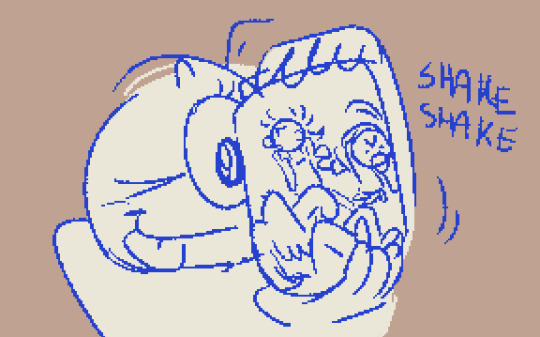
^^^^ WHAT WATCHING THE SHOW FEELS LIKE FOR ME
#my dhmis postings#WAH. LOVE BEING PROVOKED INTO SHARING MY NUTS OPINIONS TYSM#all my opinions on dhmis are off kilter and weird i know this
23 notes
·
View notes
Text
Sception Reads Cass Cain #19
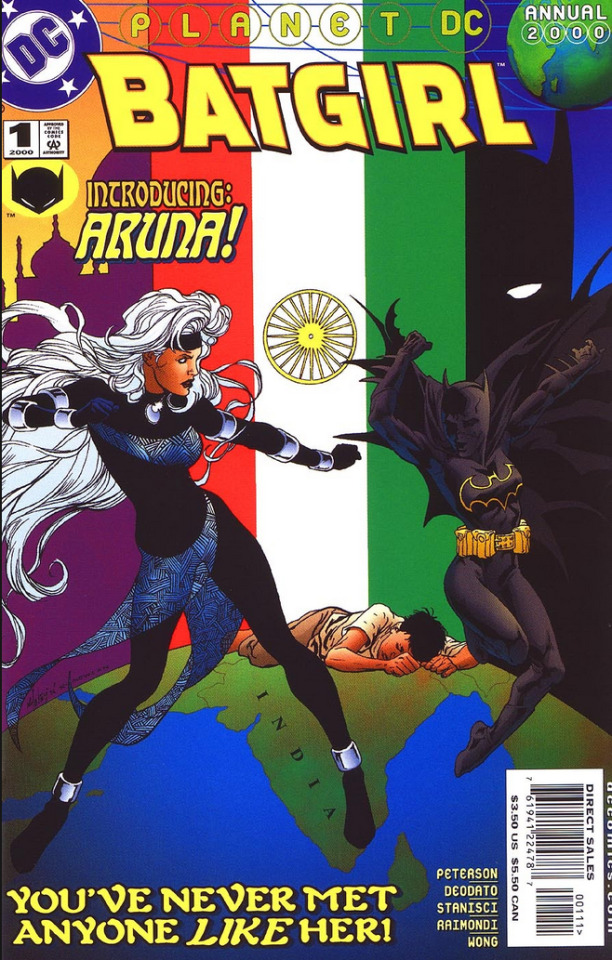
Batgirl (2000) Annual #1 Writer: Scott Peterson Pencils: Mike Deodato
The Main Batgirl solo is again left at a cliffhanger mid-arc while we look at a side issue. Maybe I should have done episodes 4-6 back to back, out of chronological order? But I've had a lot to say about issues 4 and 5, so the little breaks looking at side issues I don't have as much to say about has been a nice change of pace to buy breathing room. This time we're meeting a character named Aruna? I don't think I remember her at all. These sorts of annuals are sometimes used to have a popular established character help launch a new IP that will continue in another book. If that's what was happening here, then it's a nice show of confidence in Cass from editorial. And we've got Scott Peterson writing, so that's good, but we've seen Deodato draw Cass once before, and it, uh...
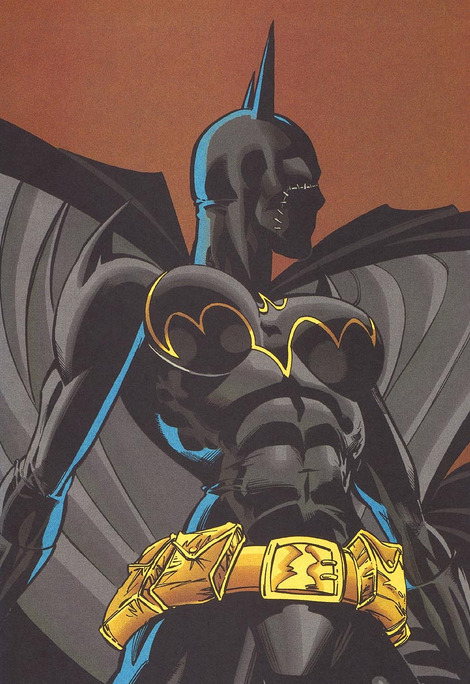
Oh.
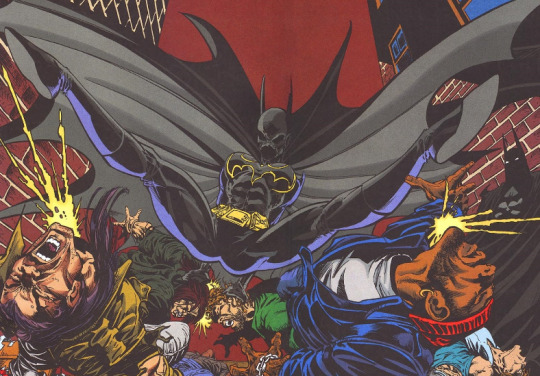
Oh, no.
...
Honestly, it's not all that bad. Most of it's fine. Much better than the last time he was drawing Cass. There are even some panels of Cass that I really like, like this one:
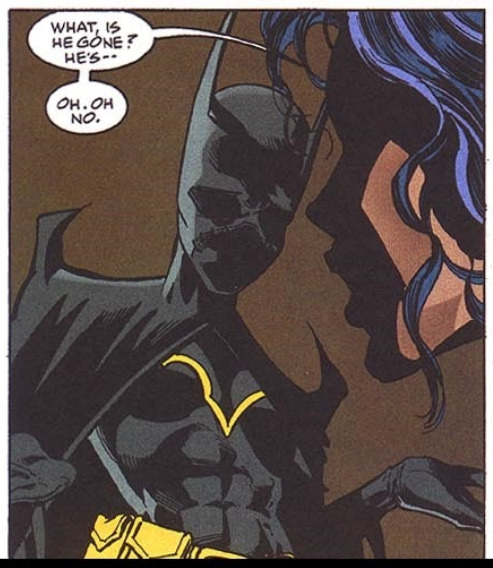
But man, those first couple pages are rough.
Anyway, yeah, while this is a 'Batgirl Annual', it exists to introduce Aruna Shende, as part of a 'DC World' thing going on at the time introducing some new international heroes and I guess seeing who sticks. Aruna is a shapeshifter with a stunt person/special effects artist alter-ego working in the Bollywood film industry while investigating the disappearance of her parents when she was a child. Bruce & Cass bump into Aruna while looking into the kidnapping of the lead actor in a film she was working on and they have a little adventure together. Aftter that there's an extended character backstory segment just for Aruna with no bats at all.
It's pretty solid. I like how Cass is able to identify Aruna when she's using her abilities to disguise herself. This is still silent Cass, but she's fairly active and expressive in the part of the issue where she's present.
As for Aruna, she's an interesting character, with a solid backstory, and its honestly a shame DC never really did anything with her after that.
There is one bit that stuck out to me though relating Aruna's story to Cass...
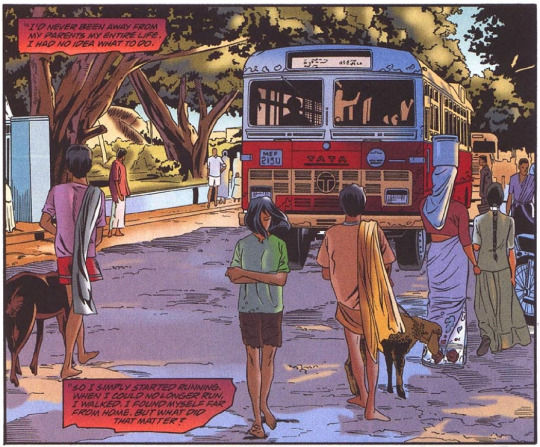
After her parents were taken by mysterious suited agents, Aruna was left as an orphan, living on her own on the street, forced basically to grow up that way while also growing into her powers and using them to take care of herself.
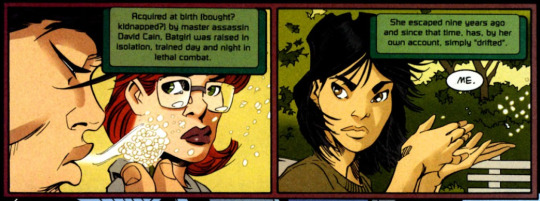
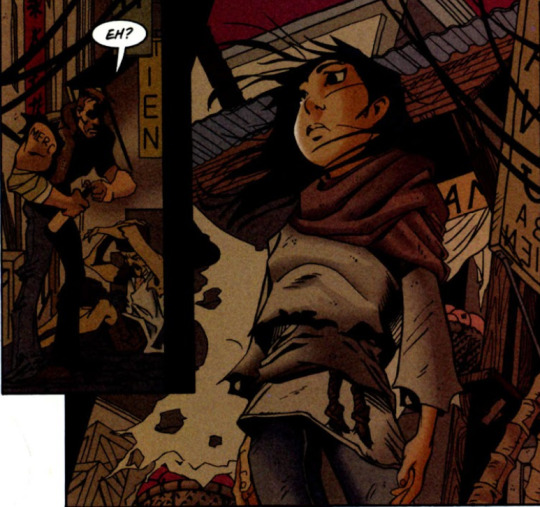
Which is very similar to how Cass lived on her own after running away from David at age 8, basically until she met Barbara during No Mans Land when she was like 16 or 17. During that entire time Cass survived on the streets, on her own, without even the ability to speak, relying on her abilities to survive.
That's a part of her life that, as far as I can remember, the old continuity never really explored outside of this one flashback with Mr. Merc from issue 1. What was life like for her? Did she form connections with anyone? She's seen the world from this abject state of poverty, seen people around her desperate to survive, presumably saw people supporting each other and tearing each other down... she was living on the streets at least as long as she was living with David Cain, it should be a big part of her world view, so much formative stuff should have happened during that period. Really meeting and spending time with people other than her father for the first time. her first crush, probably. realizing how different she was, and what her father's training had really cost her in terms of the ability to communicate and connect with other people. How does growing up in abject poverty color what she thinks about her fabulously wealthy life when she is eventually invited into the Wayne household?
And not something modern writers can really go back and fill in, since, from my limited understanding, in the reboot continuity she goes pretty much straight from assassin life to bat life without this in between period.
8 notes
·
View notes
Text
Crafting a Comprehensive Marketing Plan for Your Rehabilitation Center
In the healthcare industry, particularly within the realm of rehabilitation services, having a solid marketing plan is essential for reaching your target audience, attracting clients, and establishing your center as a trusted provider of care. A wellcrafted marketing plan not only helps in promoting your services but also in differentiating your center from competitors and ultimately driving growth and success. In this comprehensive guide, we'll delve into the key components of creating an effective marketing plan tailored specifically for a rehabilitation center.
I. Introduction to Marketing for Rehabilitation Centers
Setting the Stage: Brief overview of the importance of marketing in the healthcare sector, particularly for rehabilitation centers.
Understanding the Audience: Highlighting the diverse demographic groups that may require rehabilitation services and the significance of targeting them effectively.
II. Market Analysis
Assessing the Competitive Landscape: Conducting a thorough analysis of existing rehabilitation centers in your area, including their services, reputation, and target demographics.
Identifying Opportunities and Challenges: Pinpointing gaps in the market where your center can excel and recognizing potential obstacles that may hinder your marketing efforts.
III. Defining Your Unique Selling Proposition (USP)
Highlighting Your Center's Strengths: Identifying the unique features and strengths of your rehabilitation center, such as specialized programs, experienced staff, or stateoftheart facilities.
Addressing Client Needs: Understanding the specific needs and preferences of your target audience and how your center can fulfill them better than competitors.
IV. Setting Marketing Objectives and Goals
SMART Goals: Establishing specific, measurable, achievable, relevant, and timebound objectives for your marketing efforts, such as increasing client inquiries, improving brand awareness, or expanding services to new demographics.
Benchmarking Progress: Creating metrics to track the success of your marketing initiatives and regularly evaluating performance against set goals.
V. Developing Strategies and Tactics
Digital Marketing: Leveraging online channels such as social media, search engine optimization (SEO), and content marketing to increase visibility and attract potential clients.
Traditional Marketing: Exploring traditional methods like print advertisements, direct mail campaigns, and community outreach events to reach local audiences effectively.
Referral Programs: Establishing partnerships with healthcare professionals, community organizations, and previous clients to generate referrals and build credibility.
Educational Content: Creating informative content such as blog posts, videos, and webinars to educate the public about rehabilitation services and position your center as an authority in the field.
VI. Implementation Plan
Allocating Resources: Determining the budget, personnel, and tools required to execute your marketing plan effectively.
Timeline and Milestones: Creating a detailed schedule outlining when each marketing initiative will be launched and setting milestones for tracking progress.
Assigning Responsibilities: Delegating tasks to team members or external partners and ensuring clear communication and accountability throughout the implementation process.
VII. Monitoring and Evaluation
Tracking Key Metrics: Monitoring the performance of your marketing activities using metrics such as website traffic, conversion rates, client inquiries, and customer feedback.
Analyzing Results: Reviewing data regularly to identify trends, successes, and areas for improvement, and making adjustments to your marketing strategy accordingly.
Continuous Improvement: Adopting a mindset of continuous learning and adaptation to stay ahead of the competition and meet the evolving needs of your target audience.
VIII. Conclusion
Crafting a comprehensive marketing plan for rehabilitation center is not just about promoting your services—it's about connecting with your audience, addressing their needs, and positioning your center as the top choice for rehabilitation care. By following the steps outlined in this guide, you can develop a strategic marketing plan that not only attracts clients but also fosters longterm growth and success for your center.
2 notes
·
View notes
Text
What kind of ancestor will you be?
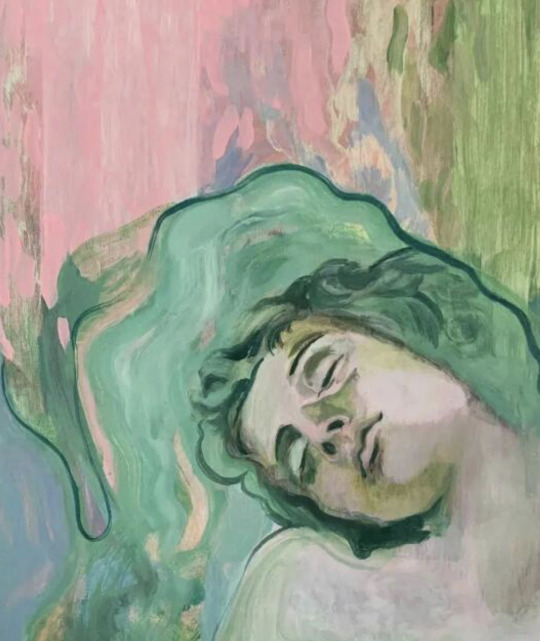
As a future museum educator, I have imagined so many ways about what can I be and what I need to do to contribute the most to museum.
For museums, we need to understand not only what we need to communicate but also what the participants are thinking, so it is important for us to understand what the participants are saying and doing, what they are thinking, what they are feeling, and whether we will be good museum educators and how we will implement museum education. Like recently when we were working on a paper on the topic of what community is, I was thinking about what we should do when we're dealing with people from different museum communities to make sure that we're communicating what they want to hear to people from each community.
After reading this week's literature, I believe that to be a good museum worker we need to be innovative in our thinking and create innovative themes and educational approaches, 1.starting with the literature that says: when we start the design thinking process- at first, we need to have Empathize, research user's needs,2. and In the Define stage, you will organize the information you have gathered during the Empathize stage. You’ll analyze your observations to define the core problems you and your team have identified up to this point. Defining the problem and problem statement must be done in a human-centered manner. 3.During the third stage of the design thinking process, designers are ready to generate ideas. You’ve grown to understand your users and their needs in the Empathize stage, and you’ve analyzed your observations in the Define stage to create a user centric problem statement. With this solid background, you and your team members can start to look at the problem from different perspectives and ideate innovative solutions to your problem statement.4.By the end of the Prototype stage, the design team will have a better idea of the product’s limitations and the problems it faces. They’ll also have a clearer view of how real users would behave, think and feel when they interact with the end product.5. Designers or evaluators rigorously test the complete product using the best solutions identified in the Prototype stage. This is the final stage of the five-stage model; however, in an iterative process such as design thinking, the results generated are often used to redefine one or more further problems. This increased level of understanding may help you investigate the conditions of use and how people think, behave and feel towards the product, and even lead you to loop back to a previous stage in the design thinking process. You can then proceed with further iterations and make alterations and refinements to rule out alternative solutions. The ultimate goal is to get as deep an understanding of the product and its users as possible. [1]
The truth is that I have some ideas inside me but they are so complex and immature that I don't know how to express them I'm constantly reading a lot of literature to make my ideas more mature.
3 notes
·
View notes
Text
As someone who's needed help repairing my relationship with cis men for like..... Literally as long as I can remember, Lord Ares has helped a FUCK TON! Definitely didn't see that coming but it's been a pretty nice surprise 😂🤣 maybe its cuz im in deep with him and Aphrodite but every day I've worked with him he impresses and surprises the fucking fuck out of me 💜 so if anyone is in the market for some healthy masculine energy in their life I'd love to recommend Papa Ares 💜☺️😁🤣👍💜🙏
At first i wasn't sure it would work
I thought, why would a trans woman wanna commune with a super masculine and violent deity but... Its hard to quite nail down what the specific deal is but idk his GDILF energy has helped a lot. I was curious if anyone else felt the same or heard of this? Or am I crazy 😂 given everything I've been thru, solid maybe 😂😭
My Lord Ares Gynaikothoina (and my Lady Aphrodite Areia) is teaching me how to control my anger, my fear, and my pain. With his divine help and guidance he will help me find justice, and he will help me become a protector. I can't become a soldier, i can't seek and destroy my enemies. They have to strike me or someone near me first or I have to identify them as immediate threat. Thanks to Lord Ares he will be my guiding light, by following it I can aim and direct not only my righteous fury but that of everyone like me who ever felt angry, sad, and confused. Please be not afraid to speak with his Lordship I beg thee. Ive learned that sometimes only a God or Goddess of War and Justice can understand your righteous fury and pain. But on top of everything, despite being a cis man he understands the horror and suffering of SA. No myths of him raping or kidnapping women. Quite the contrary, when one of Posiedion's sons tried to rape one of Ares' daughters, my Lord Ares Skewered him. And what did the Lord of the Sea do in response? Nothing. Because he was wise enough to know to not fuck with the power of a God of War's righteous fury ♥️🖤💛🔥
I think me and a few other people need someone like that in their lives 💜🖤💙
Warning tho just don't do what I did and be careful of any promises you make to them lol otherwise you'll be fine 😂😭
Im looking forward to making his altar so bad 💜🖤♥️
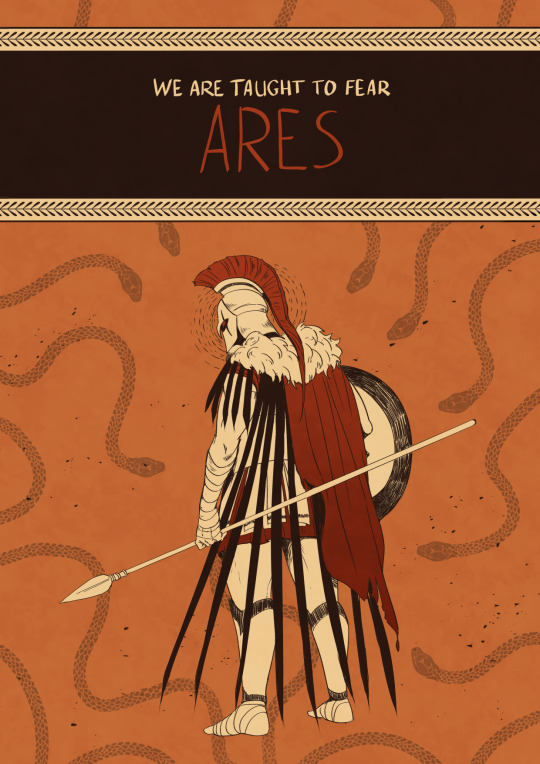
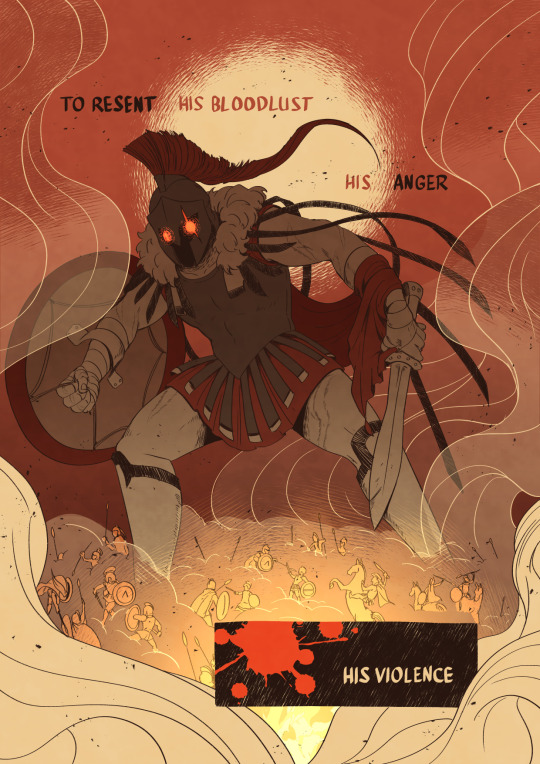
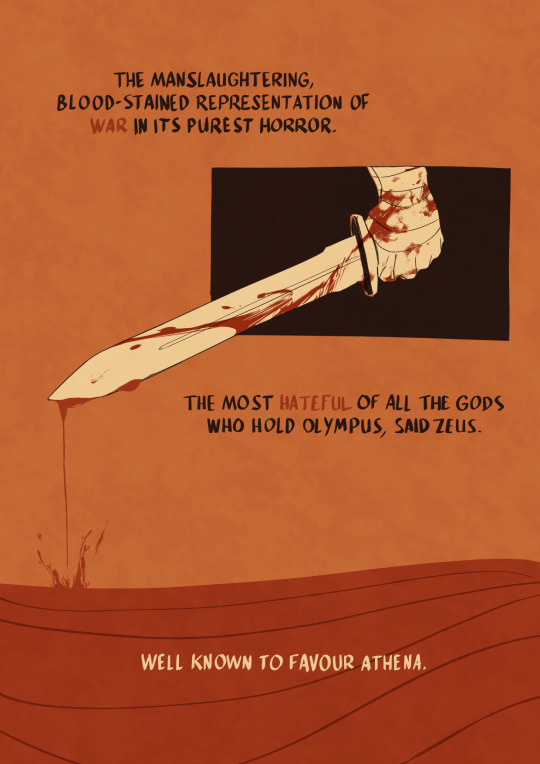
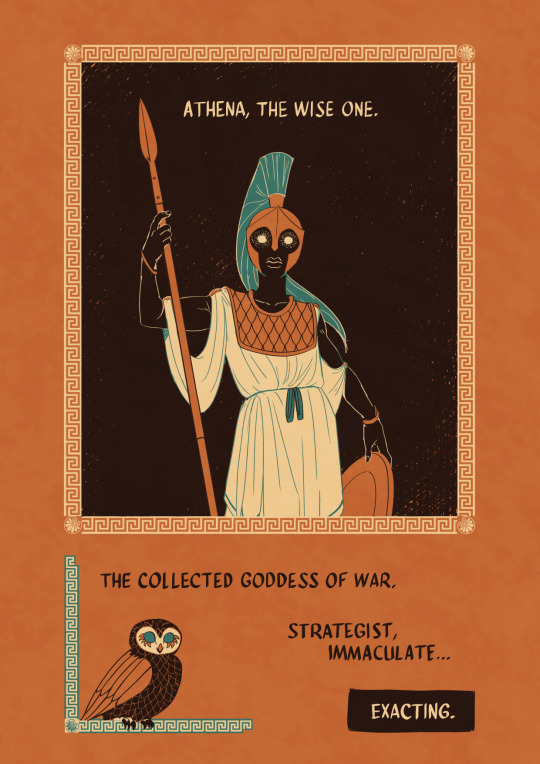
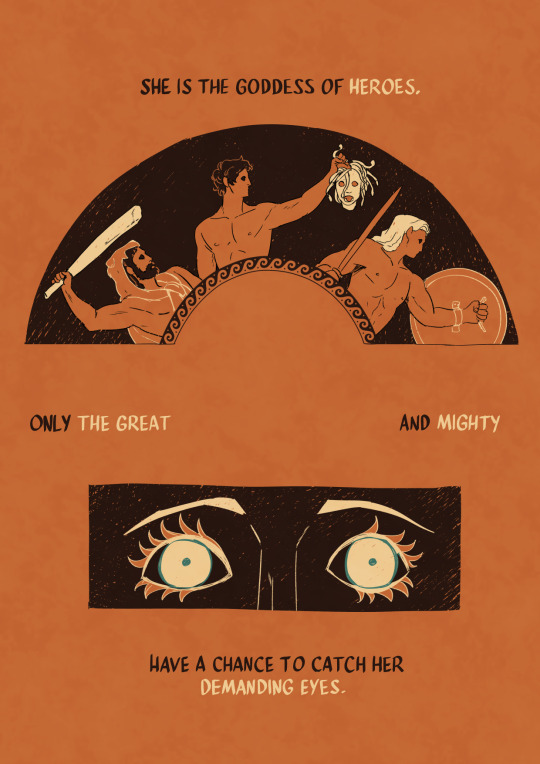
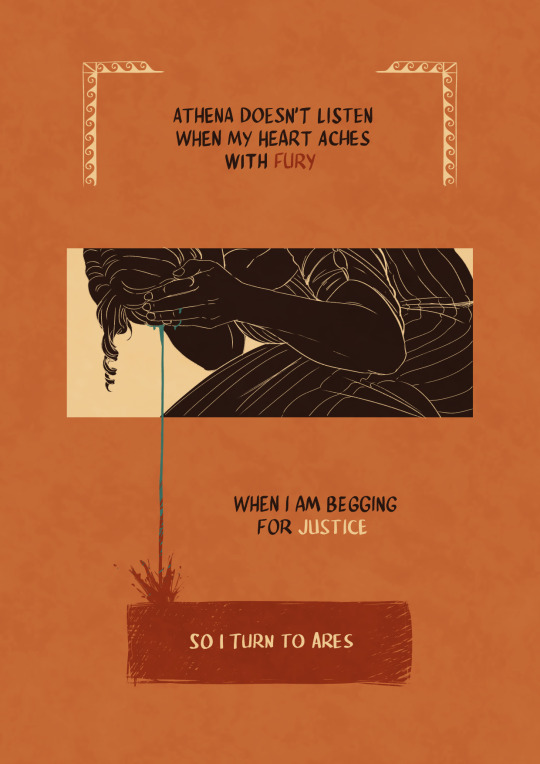
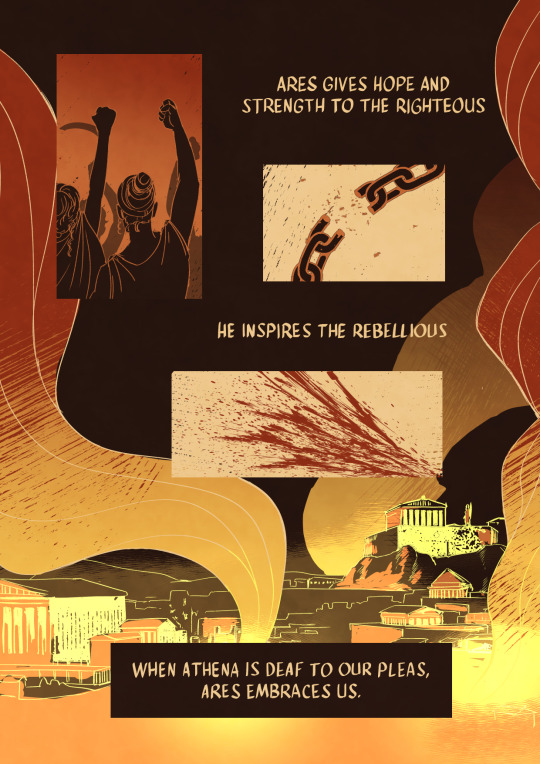
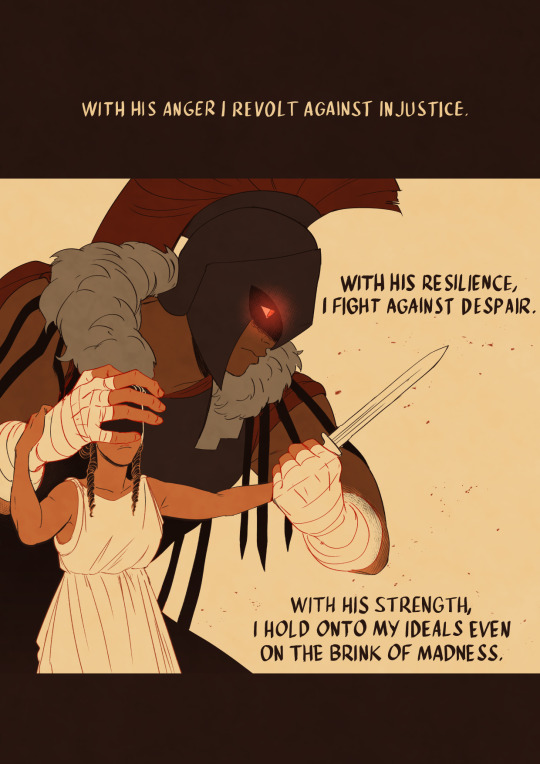
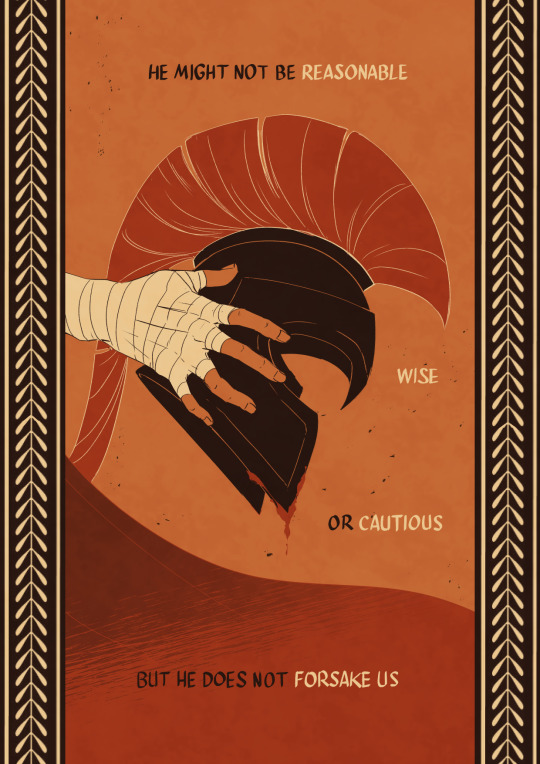
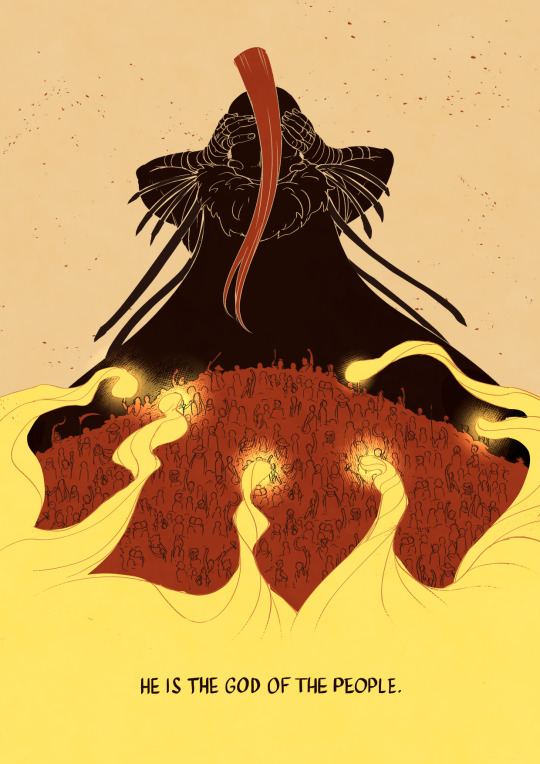
I turn to Ares.
Thanks to Tyler Miles Lockett who allowed me to draw inspiration from his ARES piece for page 2! Look at his etsy page it's SICK
⚔️ If you want to read some queer retelling of arturian legends have a look at my webtoon
#ares#lord ares#Ares Gynaikothoina#eclectic Hellenic pagan witchcraft#hellenic pagan#hellenic polytheism#tw religious themes#tw violence#tw sa mention
112K notes
·
View notes
Text
How do I know if my claim is strong?
When you're navigating the complexities of filing a claim, whether it’s for insurance, personal injury, or legal matters, knowing whether your claim is strong can save you time, energy, and resources. For residents in Council Bluffs, understanding the key elements of a strong claim can make the process smoother and increase the likelihood of success.
This guide breaks down the steps to evaluate your claim, offering practical tips and insights to help you make informed decisions.
What Makes a Claim Strong?
A strong claim is one that is backed by clear evidence, supported by law or policy, and presented with credibility. Here's what to look for:
Clear Evidence: Photos, receipts, medical records, and witness statements strengthen your case.
Legal or Policy Alignment: Ensure your claim falls within the rules of the relevant policy or legal framework.
Timeliness: File your claim as soon as possible to avoid issues with deadlines.
By understanding these basics, you can start assessing the strength of your claim.
Key Factors to Evaluate the Strength of Your Claim
1. Do You Have Solid Evidence?
Evidence is the cornerstone of any claim. The stronger your evidence, the better your chances of success. Here are some examples:
Documentation: Keep records of all relevant documents, such as contracts, invoices, or receipts.
Photos and Videos: Visual proof can be compelling, especially for property damage or accidents.
Witness Statements: Testimonies from credible witnesses can add significant weight.
Take the time to gather all necessary materials and organize them for easy access.
2. Are You Within the Filing Deadlines?
Timeliness is key. Missing a deadline could result in your claim being denied outright. Here’s what to do:
Check Statutes or Policies: Most claims have specific time limits. Review these carefully.
Act Quickly: File as soon as you can to avoid unnecessary complications.
Procrastination can jeopardize even the strongest claim.
3. Have You Consulted with an Expert?
Sometimes, it’s hard to know if your claim is valid without expert advice. Professionals such as attorneys or claims adjusters can help by:
Evaluating Your Claim: They can assess whether your claim has merit.
Providing Guidance: Experts help navigate the legal or procedural nuances.
Avoiding Pitfalls: They can identify issues that may weaken your claim.
Investing in professional input early can prevent costly mistakes later.
4. Is Liability Clear?
Understanding who is at fault is essential. A strong claim often hinges on clear liability. Consider these factors:
Direct Responsibility: Can you prove who is responsible?
Comparative Negligence: In some cases, partial fault may impact the strength of your claim.
Ensure you understand how liability works in your specific situation.
Practical Steps to Strengthen Your Claim
Organize Your Evidence
Keep everything in one place. Use folders or digital tools to store documents securely.
Seek Witness Support
Contact witnesses early, as memories fade over time.
Be Honest
Exaggerating or misrepresenting facts can weaken your claim and harm your credibility.
Stay Consistent
Inconsistent statements or missing information can raise red flags during the review process.
How to Avoid Common Pitfalls
Many claims are weakened by avoidable mistakes. Watch out for:
Incomplete Forms: Double-check that you’ve filled out every required section.
Poor Communication: Be polite and professional in all interactions with the other party.
Lack of Follow-Up: Don’t assume silence means progress. Stay proactive.
By steering clear of these errors, you’ll improve your chances of a favorable outcome.
Real-Life Example: Building a Strong Claim in Council Bluffs
Imagine you’re filing an insurance claim for storm damage in Council Bluffs. Here’s how you could ensure your claim is strong:
Step 1: Take photos of the damage immediately after the storm.
Step 2: Obtain repair estimates from local contractors.
Step 3: Review your insurance policy to confirm coverage.
Step 4: Submit all documents within the required timeframe.
By following these steps, you’re more likely to receive fair compensation.
Final Thoughts
Evaluating the strength of your claim requires careful preparation, clear evidence, and attention to deadlines. By taking these steps and consulting with professionals when needed, you’ll be in a much better position to succeed.
Don’t wait to seek the support you need. Whether you’re filing an insurance claim or pursuing a legal matter, understanding the strength of your case is the first step toward resolution. Explore additional resources or reach out to professionals in Council Bluffs to guide you through the process.
1 note
·
View note